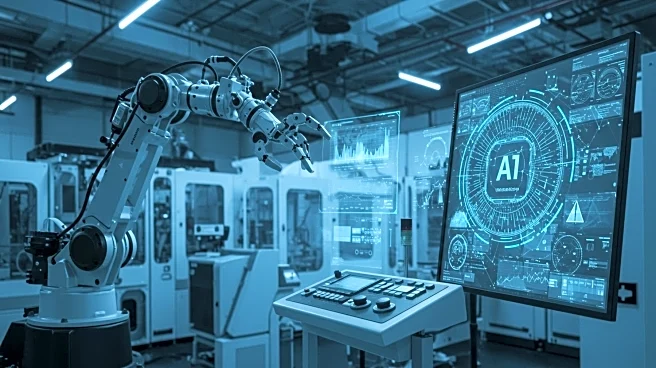What's Happening?
Toby Mankertz, Manufacturing Industry Director at Columbus, emphasizes the importance of strategic readiness in the manufacturing sector before integrating automation and AI technologies. In a discussion on the Future Bytes podcast, Mankertz highlights the necessity for manufacturers to ensure their operations are well-prepared to leverage AI effectively. He points out that while the potential of AI in manufacturing is vast, it is crucial to address existing inefficiencies and ensure data reliability before implementation. Mankertz stresses that many organizations may believe their processes are in order, but often shortcuts and workarounds exist that need to be identified and rectified. He advocates for starting with small, non-disruptive AI applications to build trust and demonstrate value, thereby easing concerns about potential impacts on production capabilities.
Why It's Important?
The integration of AI in manufacturing holds significant potential for enhancing efficiency and productivity. However, without proper preparation, there is a risk of reinforcing existing inefficiencies rather than resolving them. By focusing on strategic readiness, manufacturers can ensure that AI technologies are applied in ways that truly support production goals. This approach not only helps in achieving operational efficiency but also in maintaining competitive advantage in a rapidly evolving industry. The emphasis on data reliability and appropriate KPI tracking is crucial for deriving meaningful insights and outcomes from AI applications. As manufacturers navigate this transition, those who successfully integrate AI with a strategic foundation stand to gain significantly in terms of cost reduction, reduced downtime, and enhanced production capabilities.
What's Next?
Manufacturers are likely to continue exploring AI applications that offer quick wins and build confidence in the technology. This may involve pilot projects that focus on non-production areas initially, allowing organizations to test AI's effectiveness without risking production disruptions. As trust in AI grows, manufacturers may gradually expand its use to more critical areas of their operations. Stakeholders, including technology providers and industry leaders, will play a key role in guiding this transition, offering expertise and support to ensure successful AI integration. The ongoing dialogue about AI's role in manufacturing will likely focus on balancing technological advancements with the need for human oversight and creativity.
Beyond the Headlines
The shift towards AI in manufacturing also raises important ethical and cultural considerations. As automation increases, the role of human workers will evolve, necessitating new skills and potentially leading to workforce displacement. Manufacturers will need to address these challenges by investing in employee training and development to ensure a smooth transition. Additionally, the reliance on AI and data-driven decision-making may prompt discussions about data privacy and security, as well as the ethical implications of AI-driven processes. These considerations will be crucial in shaping the future landscape of the manufacturing industry.










